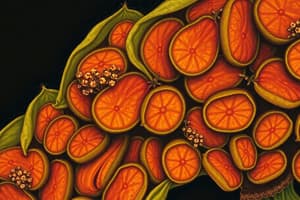Podcast
Questions and Answers
What is the process called when cells produced by meristematic tissue take on a specific role and change their shape and size?
What is the process called when cells produced by meristematic tissue take on a specific role and change their shape and size?
- Meiosis
- Photosynthesis
- Differentiation (correct)
- Mitosis
The meristematic tissue is responsible for the growth and development of plants.
The meristematic tissue is responsible for the growth and development of plants.
True (A)
What is the main function of the cells produced by meristematic tissue after they differentiate?
What is the main function of the cells produced by meristematic tissue after they differentiate?
To perform a specific function in the plant.
The process of ______ is when cells take on a permanent role, shape, and size.
The process of ______ is when cells take on a permanent role, shape, and size.
Match the following terms with their definitions:
Match the following terms with their definitions:
Flashcards
Meristematic Tissue
Meristematic Tissue
Plant tissue that can continuously divide and form new cells.
Differentiation
Differentiation
The process by which cells take on specific roles and characteristics.
Permanent Role
Permanent Role
A stable function or structure that a cell assumes after differentiation.
Cell Shape and Size
Cell Shape and Size
Signup and view all the flashcards
Specialized Cells
Specialized Cells
Signup and view all the flashcards
Study Notes
Differentiation of Cells
- Meristematic tissue produces cells that are undifferentiated.
- Differentiation is the process where these cells take on a permanent role, size, and shape.
- This process is crucial for developing specialized tissues and organs in plants.
- Undifferentiated cells are typically small, with a thin cell wall, and active metabolism.
- Differentiated cells have distinct structures and functions tailored to their specific roles. Examples include xylem cells for water transport or phloem cells for nutrient transport.
- Specialized cells have a large vacuole.
- Specialized cells have thicker cell walls, which provides structure and support.
- The process of differentiation in plants is complex and regulated by various factors, including environmental cues and internal signals.
- Differentiation involves changes in gene expression, leading to the production of specific proteins that dictate cell structure and function.
- Differentiated cells are often tightly connected or organized to form functional tissues, such as the epidermis, vascular tissues (xylem and phloem), or supporting tissues.
- The process of cell differentiation is irreversible.
- Differentiation is not uniform across the entire tissue. Different specialized cells form distinct regions within a developing tissue.
- Factors influencing differentiation include light exposure, nutritional availability, and environmental stress.
- Once a cell differentiates it typically does not undergo further division.
- Differentiation involves modifications in cellular structure and function to suit the specialized task.
Studying That Suits You
Use AI to generate personalized quizzes and flashcards to suit your learning preferences.




